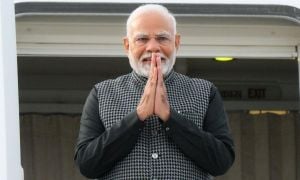Over the weekend, Columbus, Ohio, was the scene of yet another troubling display of extremist ideology as around twelve masked individuals paraded through the city's streets, waving swastika flags and shouting racist slurs. This neo-Nazi rally has prompted swift and widespread condemnation from political leaders at both state and national levels, including President Joe Biden, who described the event as a "sickening display" of hatred.
The event unfolded on Saturday afternoon, and multiple sources reported hearing individuals within the group using megaphones to broadcast aggressive and racist rhetoric. According to witnesses, the masked participants also engaged with nearby spectators, with some witnesses reporting altercations where pepper spray was allegedly used. Fortunately, no arrests were made; police determined no laws were violated during the protest.
"Neo-Nazis... roamed the streets of Columbus today, carrying Nazi flags and spewing vile and racist speech," Ohio Governor Mike DeWine expressed sharply, underlining how this act is entirely antithetical to Ohio's values. "There is no place in this state for hate, bigotry, antisemitism or violence, and we must denounce it wherever we see it."
This incident follows closely on the heels of another neo-Nazi gathering just last week outside a community theater performance of "The Diary of Anne Frank" in Michigan. The occurrences have sparked fears among Jewish communities and anti-hate organizations, as they suggest an uptick in white supremacist activities targeting vulnerable communities.
Shannon Hardin, the president of Columbus City Council, lamented the situation on social media, stating, "I’m sorry the President-elect has emboldened these creeps. This community rejects their pathetic efforts to promote fear and hate." His sentiments were echoed by other officials as well, illustrating the broader concern over the neo-Nazi movement's seeming resurgence.
The Anti-Defamation League (ADL) has been monitoring these types of events closely, noting a disturbing trend where small, organized groups are increasingly taking their online hate speech and manifesting it publicly. Oren Segal, vice-president of the ADL's Center on Extremism, commented on this trend, stating, "These relatively small and quick protests are meant to signal back to their online community their presence and strength to bring hatred actively onto the ground."
Leaders from national Jewish organizations have similarly denounced the happenings. The American Jewish Committee’s regional director, Lee Shapiro, called the Columbus rally "another sad example of the bigotry we have witnessed across the country." Both the Columbus Jewish Federation and the Jewish Community Relations Council issued statements expressing their disgust over the incident. The rally has also ignited discussions about the rising sentiment of hate and racism throughout the nation.
Columbus's Democratic mayor and city attorney Zach Klein joined the chorus of condemnation, asserting, "Columbus embraces diversity of opinions, religions, backgrounds and everything else, but we will never embrace hate." He urged the individuals involved to leave the city and never return, emphasizing the solidarity with marginalized communities across the state.
Despite this recent uptick of visible hate, other communities are also stepping up against such expressions of bigotry. Just over the weekend, hundreds of concerned citizens gathered outside a library in Whitpain Township, Pennsylvania, when reports emerged of a Nazi flag being displayed outside a private residence. This public act resulted in significant backlash, prompting the homeowners to take down the swastika flag and replace it with the American flag.
Lynne Krause, president of the newly formed Darchei Noam synagogue, noted the significance of such acts. "The thing that's scary... is someone was willing, in their neighborhood, to put out a Nazi flag. That says something about them." Her comment encapsulates the gravity of these protests, highlighting the perceived normalization of white supremacist sentiments among some individuals.
These disturbing incidents prompt serious questions surrounding the growing visible presence of neo-Nazi groups and their rhetoric. Many fear this may only be the beginning if left unchecked, particularly with the political climate stirring increasing discontent. Jewish communities and allies across the United States are now facing the challenge of counteracting these hateful movements, advocating for tolerance, and ensuring community safety amid rising threats.
Authorities continue addressing the complex balance between lawful assembly and the protection of marginalized communities from harassment. Police Chief Elaine R. Bryant echoed this sentiment, stating, "The Constitution protects First Amendment activity, no matter how hateful. We are bound by the law... No one in our community should experience intimidation or harassment." Yet, many observers argue it’s past time to take stronger measures against extreme hate groups who intimidate and instill fear among the public.
Only time will tell how local communities and the country at large respond to these challenges, as calls for unity and resilience to combat hate grow louder. The Columbus and Whitpain Township protests are signals of rising tension and urgency needed to confront and counter hate as it appears more boldly than ever.



